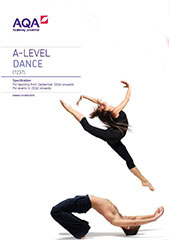Non-exam assessment administration
The non-exam assessment (NEA) for this specification is practical performance and group choreography.
Visit aqa.org.uk/7237 for detailed information about all aspects of NEA administration.
The head of the school or college is responsible for making sure that NEA is conducted in line with our instructions and Joint Council for Qualifications (JCQ) instructions.
Supervising and authenticating
To meet Ofqual’s qualification criteria and conditions, the requirements set out in Assessment components of the specification must be adhered to. Evidence of authentication for each student must include:
- a Candidate record form (CRF), signed by the student and their teacher to confirm that all the student’s Non-exam assessment (NEA) evidence submitted is their own work and was conducted under the conditions laid down by this specification
- video recordings of each student’s performance/choreography, which identify the student by name and candidate number.
Students must have sufficient direct supervision to ensure that the work submitted can be confidently authenticated as their own. This means that you must review the progress of work during its production to see how it develops.
Any work produced without supervision, for example outside of the classroom, should be compared to work produced with supervision.
In comparing the student's work, consideration must be given to the consistency in levels of skill demonstrated.
Work that cannot be confidently authenticated must not be included in the student's submission.
You are required to provide details of the support the student received on the CRF and sign the authentication statement. If the statement is not signed, we cannot accept the student’s work for assessment.
Visiting examination
An AQA examiner will visit your school/college by arrangement with AQA, to mark all your candidates’ work for Component 1. The visit will take place between 1 March and 30 May in the certificating year.
NEA evidence, including video recordings, must be given to the examiner at the end of the assessment session. Enquires about results (EARs) will be based on the audio visual recording taken by the visiting examiner on the day of assessment.
Avoiding malpractice
Please inform your students of the AQA regulations concerning malpractice. They must not:
- submit work that is not their own
- lend work to other students
- allow other students access to, or use of, their own independently-sourced source material
- include work copied directly from books, the internet or other sources without acknowledgement
- submit work that is word-processed by a third person without acknowledgement
- include inappropriate, offensive or obscene material.
These actions constitute malpractice and a penalty will be given (for example, disqualification).
If you identify malpractice before the student signs the declaration of authentication, you don’t need to report it to us. Please deal with it in accordance with your school or college’s internal procedures. We expect schools and colleges to treat such cases very seriously.
If you identify malpractice after the student has signed the declaration of authentication, the head of your school or college must submit full details of the case to us at the earliest opportunity. Please complete the form JCQ/M1, available from the JCQ website at jcq.org.uk
You must record details of any work which is not the student’s own on the front of the assessment booklet or other appropriate place.
You should consult your exams officer about these procedures.
Factors affecting individual students
For advice and guidance about arrangements for any of your students, please email us as early as possible at eos@aqa.org.uk
Occasional absence: you should be able to accept the occasional absence of students by making sure they have the chance to make up what they have missed. You may organise an alternative supervised session for students who were absent at the time you originally arranged.
Lost work: if work is lost you must tell us how and when it was lost and who was responsible, using our special consideration online service at aqa.org.uk/eaqa
Special help: where students need special help which goes beyond normal learning support, please use the CRF to tell us so that this help can be taken into account during marking.
Students who move schools: students who move from one school or college to another during the course sometimes need additional help to meet the requirements. How you deal with this depends on when the move takes place. The new school or college should be responsible for the work. Teachers in the new school or college must ensure that student work submitted for assessment can be confidently authenticated as their own. See Supervising and authenticating.
After the exams
You may need to keep some of your students’ work to meet Ofqual requirements for awarding, archiving or standardisation purposes.
